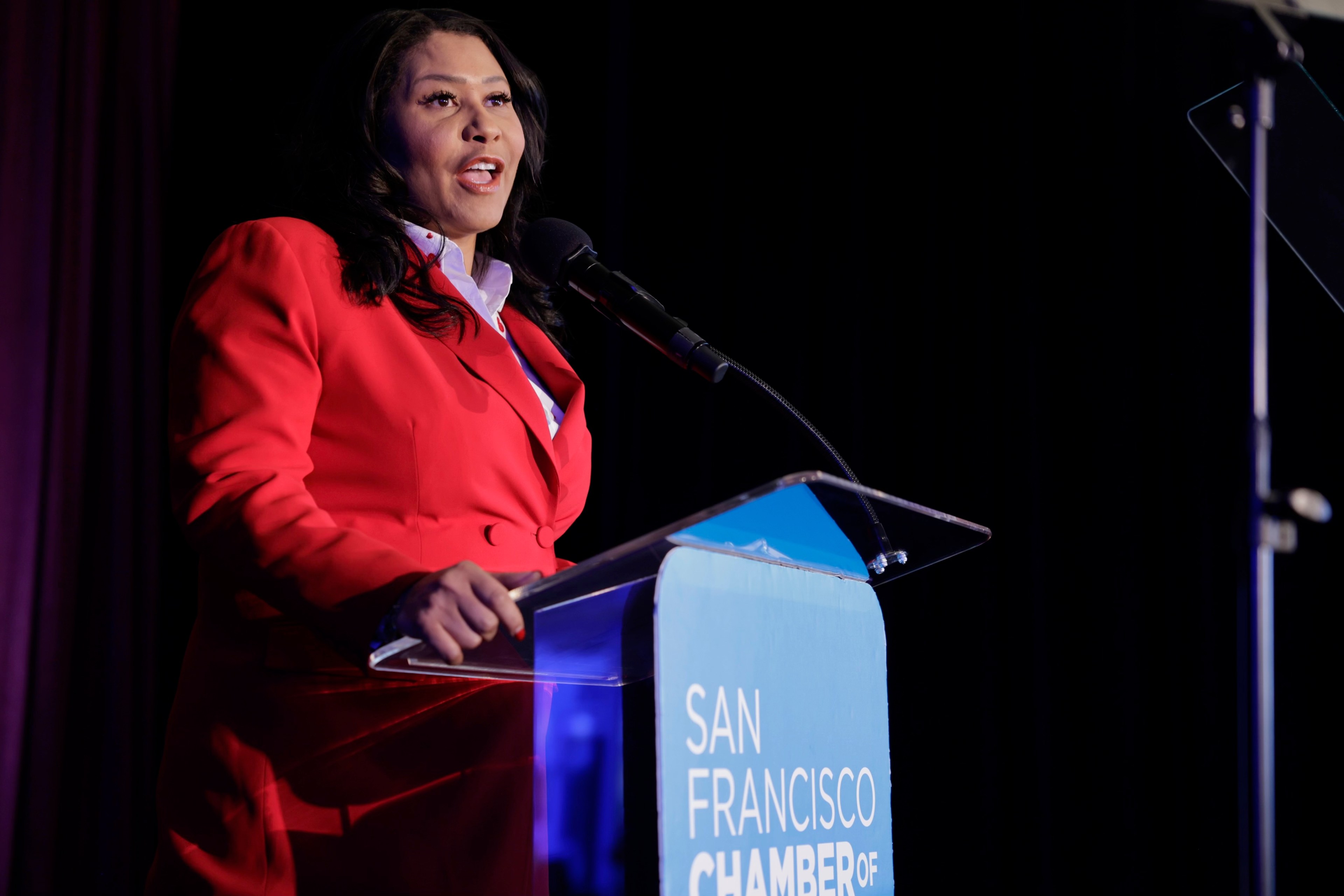On a slightly overcast Valentine’s Day with sweeping views of the Bay Bridge, San Francisco business and civic leaders at the Chamber of Commerce CityBeat Breakfast painted the picture of a downtrodden city finally turning the page into an era of grand recovery.
It was a bit of an ironic message, particularly considering some of the survey data presented at the event itself.
A Chamber of Commerce survey found that 72% of voters believe that the city is on the wrong track, compared with only 22% who said the opposite. The number was slightly improved from the 77% figure in the Chamber’s survey back in May, but still a far cry from the 46% who believed the arrow was pointed downward in 2019.
The mixed mood and messaging were hard to ignore, even from the stage.
“I know this sounds a little bit strange, but I want to start off by saying how proud I am of all San Franciscans,” Chamber of Commerce CEO Rodney Fong said, to slightly stuttering applause from attendees nibbling on a light breakfast of leafy greens and an appropriate treat: chocolate-dipped strawberries.
Signs of the vibe shift, according to Fong, were voters’ desire to take action on the city’s problems at the ballot box. Alongside the breakfast, the Chamber released polling showing a majority of voters supported ballot measures in the March 5 election that would increase police powers to use surveillance technology and conduct pursuits (Prop. E), predicate cash welfare on drug addiction screening (Prop. F) and provide tax breaks for office-to-residential conversions (Prop. C).
Fong noted that the theme of the last CityBeat breakfast in 2020 before the pandemic was “Wake Up San Francisco,” an allusion to the problems already starting to fester in the boom times.
It took a few years, Fong said in his remarks, but he feels that the city is finally heeding that call.
“I’m confident that 2024 will be a year that lays the foundation for a stronger, more inclusive and even more innovative San Francisco,” Fong said.
‘We still have work to do’
In her keynote remarks, Mayor London Breed’s overarching message was that to turn a corner, San Francisco needs to embrace being “aggressive” and “uncomfortable” in its approach to long-standing issues, such as homelessness and drug crimes.
She targeted “naysayers” both outside and inside the city who seemed to gloat over its misfortune.
“There were those who said that the economic fallout from the pandemic might be a good thing. Can you imagine that?” Breed said.
Breed, who’s facing a tough reelection fight in November, defended her record on public safety, saying her policies led to the second-lowest crime rate over the past 10 years in 2023.
“People need help in San Francisco, and if you aren’t willing to get a little aggressive, then you’re willing to let the stuff that’s continuing to happen on our streets continue,” she said, touting her work with state and federal officials to tamp down drug dealing.
“Change makes people uncomfortable, but I’m not worried about that because you know who we need to make uncomfortable? The drug dealer selling deadly fentanyl on the streets of our city,” she said.
And, although outside media has long been an adversary, Breed approvingly quoted recent Bloomberg, New York Times and Economist headlines about the city’s rebound.
“Surprising, comeback? Maybe for some, but not for those of us who’ve been here doing the work, for those who believe, for those who have always been here,” Breed said.
The dissonance between rah-rah cheerleading and larger public opinion grew obvious when around five minutes after Breed’s remarks, event organizers showed data about the 72% of San Francisco voters who said the city is on the wrong track. The proportion of San Franciscans who think that economic conditions are better today than a year ago went from 12% in 2023 to 20% in 2024.
But around 50% felt things were worse, and voters who believe that economic conditions will be worse a year from now outnumbered those who thought things would be better.
A voter guide released by the Chamber found the business interest group aligned with nearly all of the mayor’s priorities. One glaring exception was the “no position” taken by the Chamber on Prop. F’s rules around addiction screening for city welfare recipients.
Carlos Solórzano-Cuadra, CEO of the city’s Hispanic Chamber of Commerce, said in an interview that while he appreciates the mayor’s optimistic messaging, he isn’t writing off all of the worries about public safety and the economy. He added that he would like the business community to shift some of its focus away from downtown and to neighborhoods like the Mission.
“We still have work to do,” said Solórzano-Cuadra. “There are things that need to be done better.”
Hanging over the breakfast were two fiercely contested elections likely among the most consequential in San Francisco’s recent history. In the audience were at least two other candidates vying for her job: Mark Farrell and Daniel Lurie.
At his campaign kickoff event on Tuesday, Farrell—Breed’s predecessor—painted a darker picture of the city’s condition, mirroring the Chamber’s public opinion polling. Instead of questioning the doom loop claims, he embraced them as a sign of how lost the city is.
“We have a doom loop, and we are losing our mantle as a world-class city,” Farrell said. “We are literally now being compared to Detroit and Oakland. That is not the conversation where San Francisco belongs.”
